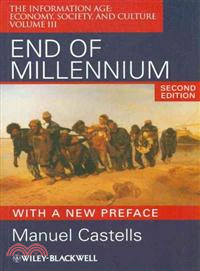End Of Millennium 2E - With New Preface
商品資訊
ISBN13:9781405196888
出版社:John Wiley & Sons Inc
作者:Castells
出版日:2010/03/05
裝訂/頁數:平裝/488頁
規格:22.9cm*15.2cm*3cm (高/寬/厚)
版次:3
商品簡介
作者簡介
目次
商品簡介
This final volume in Manuel Castells' trilogy, with a substantial new preface, is devoted to processes of global social change induced by the transition from the old industrial society to the emerging global network society.
Explains why China, rather than Japan, is the economic and political actor that is revolutionizing the global system
Reflects on the contradictions of European unification, proposing the concept of the network state
Substantial new preface assesses the validity of the theoretical construction presented in the conclusion of the trilogy, proposing some conceptual modifications in light of the observed experience
Explains why China, rather than Japan, is the economic and political actor that is revolutionizing the global system
Reflects on the contradictions of European unification, proposing the concept of the network state
Substantial new preface assesses the validity of the theoretical construction presented in the conclusion of the trilogy, proposing some conceptual modifications in light of the observed experience
作者簡介
Manuel Castells is Professor Emeritus of Sociology and Planning at the University of California, Berkeley. He is also University Professor and the Wallis Annenberg Chair in Communication Technology and Society at the University of Southern California, Los Angeles, and Research Professor at the Open University of Catalonia in Barcelona. He is Distinguished Visiting Professor of Technology and Society at M.I.T., and Distinguished Visiting Professor of Internet Studies at Oxford University. He is the recipient of numerous academic awards, including the Guggenheim Fellowship, C. Wright Mills Award, the Robert and Helen Lynd Award from the American Sociological Association, and the Ithiel de Sola Pool Award from the American Political Science Association. He is a Fellow of the European Academy, a Fellow of the Spanish Royal Academy of Economics, and a Corresponding Fellow of the British Academy. He has received 16 honorary doctorates from universities around the world, and has been knighted by five countries. He has authored 23 books, among which is the trilogy The Information Age: Economy, Society, and Culture, first published by Blackwell in 1996–8, and translated into 22 languages.
目次
List of Tables.
List of Figures.
List of Charts.
Preface to the 2010 Edition of End of Millennium.
Acknowledgments 1997.
A Time of Change.
1 The Crisis of Industrial Statism and the Collapse of the Soviet Union.
The Extensive Model of Economic Growth and the Limits of Hyperindustrialism.
The Technology Question.
The Abduction of Identity and the Crisis of Soviet Federalism.
The Last Perestroika.
Nationalism, Democracy, and the Disintegration of the Soviet State.
The Scars of History, the Lessons for Theory, the Legacy for Society.
2 The Rise of the Fourth World: Informational Capitalism, Poverty, and Social Exclusion.
Toward a Polarized World? A Global Overview.
The De-humanization of Africa.
Marginalization and selective integration of Sub-Saharan Africa in the informational-global economy.
Africa’s technological apartheid at the dawn of the Information Age.
The predatory state.
Zaıre: the personal appropriation of the state.
Nigeria: oil, ethnicity, and military predation.
Ethnic identity, economic globalization, and state formation in Africa.
Africa's plight.
Africa's hope? The South African connection.
Out of Africa or back to Africa? The politics and economics of self-reliance.
The New American Dilemma: Inequality, Urban Poverty, and Social Exclusion in the Information Age.
Dual America.
The inner-city ghetto as a system of social exclusion.
When the underclass goes to hell.
Globalization, Over-exploitation, and Social Exclusion: the View from the Children.
The sexual exploitation of children.
The killing of children: war massacres and child soldiers.
Why children are wasted.
Conclusion: the Black Holes of Informational Capitalism.
3 The Perverse Connection: the Global Criminal Economy.
Organizational Globalization of Crime, Cultural Identification of Criminals.
The Pillage of Russia.
The structural perspective.
Identifying the actors.
Mechanisms of Accumulation.
Narcotrafico, Development, and Dependency in Latin America.
What are the economic consequences of the drugs industry for Latin America?
Why Colombia?
The Impact of Global Crime on Economy, Politics, and Culture.
4 Development and Crisis in the Asian Pacific: Globalization and the State.
The Changing Fortunes of the Asian Pacific.
Heisei’s Japan: Developmental State versus Information Society.
A social model of the Japanese developmental process.
Declining sun: the crisis of the Japanese model of development.
The end of "Nagatacho politics".
Hatten Hokka and Johoka Shakai: a contradictory relationship.
Japan and the Pacific.
Beheading the Dragon? Four Asian Tigers with a Dragon Head, and their Civil Societies.
Understanding Asian development.
Singapore: state nation-building via multinational corporations.
South Korea: the state production of oligopolistic capitalism.
Taiwan: flexible capitalism under the guidance of an inflexible state.
Hong Kong model versus Hong Kong reality: small business in a world economy, and the colonial version of the welfare state.
The breeding of the tigers: commonalities and dissimilarities in their process of economic development.
The developmental state in East Asian industrialization: on the concept of the developmental state.
The rise of the developmental state: from the politics of survival to the process of nation-building.
The state and civil society in the restructuring of East Asia: how the developmental state succeeded in the development process.
Divergent paths: Asian "tigers" in the economic crisis.
Democracy, identity, and development in East Asia in the 1990s.
Chinese Developmental Nationalism with Socialist Characteristics.
The new Chinese revolution.
Guanxi capitalism? China in the global economy.
China's regional developmental states and the bureaucratic (capitalist) entrepreneurs.
Weathering the storm? China in the Asian economic crisis.
Democracy, development, and nationalism in the new China.
Conclusion: Globalization and the State.
5 The Unification of Europe: Globalization, Identity, and the Network State.
European Unification as a Sequence of Defensive Reactions: a Half-century Perspective.
Globalization and European Integration.
Cultural Identity and European Unification.
The Institutionalization of Europe: the Network State.
European Identity or European Project?
Conclusion: Making Sense of our World.
Genesis of a New World.
A New Society.
The New Avenues of Social Change.
Beyond this Millennium.
What is to be Done?
Finale.
Summary of Contents of Volumes I and II.
References.
Index.
List of Figures.
List of Charts.
Preface to the 2010 Edition of End of Millennium.
Acknowledgments 1997.
A Time of Change.
1 The Crisis of Industrial Statism and the Collapse of the Soviet Union.
The Extensive Model of Economic Growth and the Limits of Hyperindustrialism.
The Technology Question.
The Abduction of Identity and the Crisis of Soviet Federalism.
The Last Perestroika.
Nationalism, Democracy, and the Disintegration of the Soviet State.
The Scars of History, the Lessons for Theory, the Legacy for Society.
2 The Rise of the Fourth World: Informational Capitalism, Poverty, and Social Exclusion.
Toward a Polarized World? A Global Overview.
The De-humanization of Africa.
Marginalization and selective integration of Sub-Saharan Africa in the informational-global economy.
Africa’s technological apartheid at the dawn of the Information Age.
The predatory state.
Zaıre: the personal appropriation of the state.
Nigeria: oil, ethnicity, and military predation.
Ethnic identity, economic globalization, and state formation in Africa.
Africa's plight.
Africa's hope? The South African connection.
Out of Africa or back to Africa? The politics and economics of self-reliance.
The New American Dilemma: Inequality, Urban Poverty, and Social Exclusion in the Information Age.
Dual America.
The inner-city ghetto as a system of social exclusion.
When the underclass goes to hell.
Globalization, Over-exploitation, and Social Exclusion: the View from the Children.
The sexual exploitation of children.
The killing of children: war massacres and child soldiers.
Why children are wasted.
Conclusion: the Black Holes of Informational Capitalism.
3 The Perverse Connection: the Global Criminal Economy.
Organizational Globalization of Crime, Cultural Identification of Criminals.
The Pillage of Russia.
The structural perspective.
Identifying the actors.
Mechanisms of Accumulation.
Narcotrafico, Development, and Dependency in Latin America.
What are the economic consequences of the drugs industry for Latin America?
Why Colombia?
The Impact of Global Crime on Economy, Politics, and Culture.
4 Development and Crisis in the Asian Pacific: Globalization and the State.
The Changing Fortunes of the Asian Pacific.
Heisei’s Japan: Developmental State versus Information Society.
A social model of the Japanese developmental process.
Declining sun: the crisis of the Japanese model of development.
The end of "Nagatacho politics".
Hatten Hokka and Johoka Shakai: a contradictory relationship.
Japan and the Pacific.
Beheading the Dragon? Four Asian Tigers with a Dragon Head, and their Civil Societies.
Understanding Asian development.
Singapore: state nation-building via multinational corporations.
South Korea: the state production of oligopolistic capitalism.
Taiwan: flexible capitalism under the guidance of an inflexible state.
Hong Kong model versus Hong Kong reality: small business in a world economy, and the colonial version of the welfare state.
The breeding of the tigers: commonalities and dissimilarities in their process of economic development.
The developmental state in East Asian industrialization: on the concept of the developmental state.
The rise of the developmental state: from the politics of survival to the process of nation-building.
The state and civil society in the restructuring of East Asia: how the developmental state succeeded in the development process.
Divergent paths: Asian "tigers" in the economic crisis.
Democracy, identity, and development in East Asia in the 1990s.
Chinese Developmental Nationalism with Socialist Characteristics.
The new Chinese revolution.
Guanxi capitalism? China in the global economy.
China's regional developmental states and the bureaucratic (capitalist) entrepreneurs.
Weathering the storm? China in the Asian economic crisis.
Democracy, development, and nationalism in the new China.
Conclusion: Globalization and the State.
5 The Unification of Europe: Globalization, Identity, and the Network State.
European Unification as a Sequence of Defensive Reactions: a Half-century Perspective.
Globalization and European Integration.
Cultural Identity and European Unification.
The Institutionalization of Europe: the Network State.
European Identity or European Project?
Conclusion: Making Sense of our World.
Genesis of a New World.
A New Society.
The New Avenues of Social Change.
Beyond this Millennium.
What is to be Done?
Finale.
Summary of Contents of Volumes I and II.
References.
Index.
主題書展
更多
主題書展
更多書展購物須知
外文書商品之書封,為出版社提供之樣本。實際出貨商品,以出版社所提供之現有版本為主。部份書籍,因出版社供應狀況特殊,匯率將依實際狀況做調整。
無庫存之商品,在您完成訂單程序之後,將以空運的方式為你下單調貨。為了縮短等待的時間,建議您將外文書與其他商品分開下單,以獲得最快的取貨速度,平均調貨時間為1~2個月。
為了保護您的權益,「三民網路書店」提供會員七日商品鑑賞期(收到商品為起始日)。
若要辦理退貨,請在商品鑑賞期內寄回,且商品必須是全新狀態與完整包裝(商品、附件、發票、隨貨贈品等)否則恕不接受退貨。













